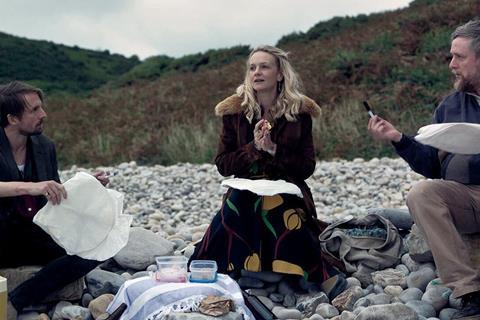
UK comedy The Ballad Of Wallis Island opens the Munich Film Festival tomorrow night (June 28). The Munich premiere, through Universal Pictures International Germany, marks the latest stage in a carefully managed, gradual rollout of a film that has become something of a word-of-mouth hit since it world premiered at Sundance in January.
The Ballad Of Wallis Island stars Tim Key as an eccentric fan who invites a once successful folk duo, McGwyer Mortimer (played by Tom Basden and Carey Mulligan), to give a private concert on a remote island with unexpected consequences. It is directed by James Griffiths and produced by Rupert Majendie of Baby Cow, with Focus Features financing and Bankside Films handling international sales
The film has had an eclectic launch, initially building word of mouth in the UK as the ‘surprise’ film of the Glasgow Film Festival in March and then as the opening film of the Sands International Film Festival in St. Andrews in April. It has since been championed by a wide range of podcasters, comedians, journalists and industry figures including Notting Hill director Richard Curtis.

“We set out to make it a word-of-mouth sensation so focused our campaign on generating buzz via high-profile personal endorsements and a genuine word-of-mouth approach, making sure the film cut through in a different way in a busy release corridor,” explains Kezia Williams, managing director of UK and Ireland at Universal Pictures International (UPI).
From short to screen
The origins of The Ballad Of Wallis Island stretch back nearly two decades, when comedians Key and Basden co-wrote and starred in the 2007 short film The One And Only Herb McGwyer Plays Wallis Island that was also directed by Griffiths and went on to be nominated for a 2008 Bafta Film Award.
During the Covid lockdown, Key and Basden expanded the short into a feature-length script and took it to Majendie at Steve Coogan-owned production company Baby Cow. Both knew Majendie well through the live comedy circuit (he runs a weekly show at The Moth Club in Hackney).

At the time, Majendie had just produced his debut feature Brian And Charles, which was also expanded from a short film. “I read the script for The Ballad Of Wallis Island and it was incredible. It didn’t need loads of notes. I thought, ‘We’ve got to make this,’” he recalls.
It also coincided with a Baby Cow move to expand its comedy film output. “TV is getting harder and harder for comedy because of budget restrictions. There is less risk and fewer opportunities. So film is an interesting medium for comedy voices to explore,” says Majendie.
Having previously worked with Focus Features on Brian And Charles, he sent Focus the script to The Ballad Of Wallis Island, and the company came on board to fully finance the feature. Bankside, which had also repped Brian And Charles, boarded for international sales.
At that stage, Carey Mulligan wasn’t attached to the role of Nell Mortimer, with Key the lynchpin for getting the actress on board. Mulligan had previously been in email contact with Key about hosting a charity event, which he had politely declined, explaining that hosting was not his forte. But he kept her email and eventually sent her the script.
“That was on the Thursday and I was on the phone to her agent the following Tuesday,” says Majendie. “She read the script and fell in love with it.”
Mulligan, who had recently had a baby, had a ten-day window to film, and the entire shoot was scheduled in the summer of 2023 across 18 days. “That was guided by time and money but sometimes things are better for that,” says Majendie of the condensed schedule.
The Ballad Of Wallis Island was not filmed on an island, but on a secluded stretch of coastline in Pembrokeshire in Wales offered up by a local farmer. The budget was under £5m.
Building word of mouth

Going into the world premiere of The Ballad Of Wallis Island at Sundance Film Festival, Majendie was unsure how a US audience was going to react to the film’s main protagonist, Charles Heath, a highly eccentric British oddball.
“Charles is a very specific taste but within two or three minutes, the audience of 1,500 people were laughing at him and with him. At the end, we had a standing ovation.”
From Sundance onwards, the campaign focused on building word of mouth, both in the UK where the film launched on May 30 through UPI and in the US where it launched on March 28 through Focus.
In the UK, the film opened in 129 locations in its first week, expanding to a peak of 344 locations in week three, and is still in over 300 locations as of last weekend. It’s taken £1.2m so far at the UK box office.
“Our strategy was to increase the locations as the word of mouth was building,” says UPI’s Williams. “We wanted to play the ‘long game’ rather than aiming for a big first weekend.”
In the US, the film similarly had a limited release before expanding to 423 screens, eventually taking £1.6m according to Box Office Mojo.
In the UK, the film was screened to journalists, tastemakers, comedians, podcast hosts and others in the film industry. Richard Curtis in particular was an early champion, calling it “one of the greatest British films of all time”, and hosting a screening for his influential industry network. Former Labour party strategist Alastair Campbell attended an early screening, too, and went on to plug the film on his popular The Rest Is Politics podcast.
The film also tapped into Baby Cow’s comedy network, who shouted about the film across their various platforms. “We knew that when you have the right film, getting it in front of the right people would guarantee them becoming champions for the film on our behalf,” says Williams.
The cast also worked hard to support the UK release. “Carey Mulligan brought the Hollywood A-List star power to the campaign which allowed us to elevate the film beyond an indie cinemagoing crowd,” says Williams, with the actress appearing on the BBC’s flagship chat series The One Show (as well as Jimmy Kimmel Live! during the earlier US rollout).
As for Basden and Key, they participated in several public Q&As around release that were promoted extensively to their comedy fanbases across the pair’s social channels.
“These screenings proved to be an effective way to incentivise audiences to go to the cinema, so their support has been a real asset to the film’s success,” says Williams.


